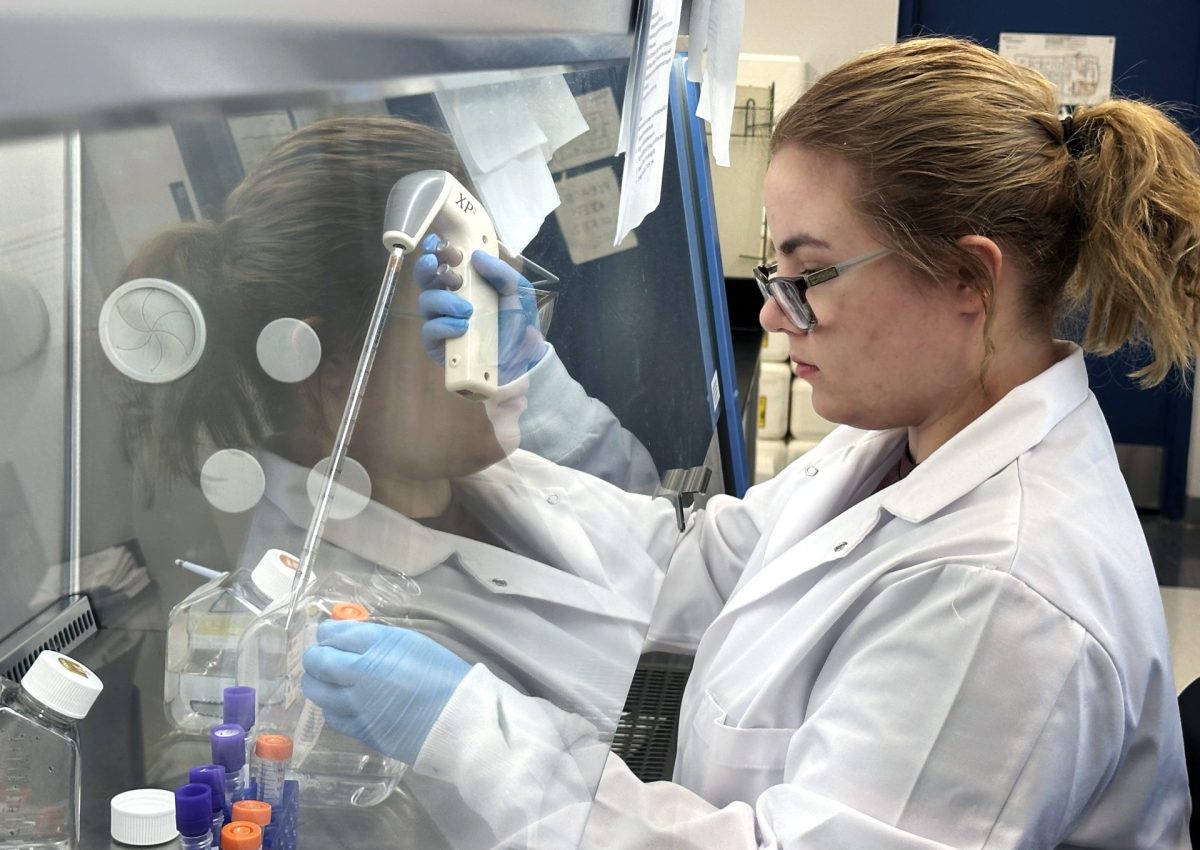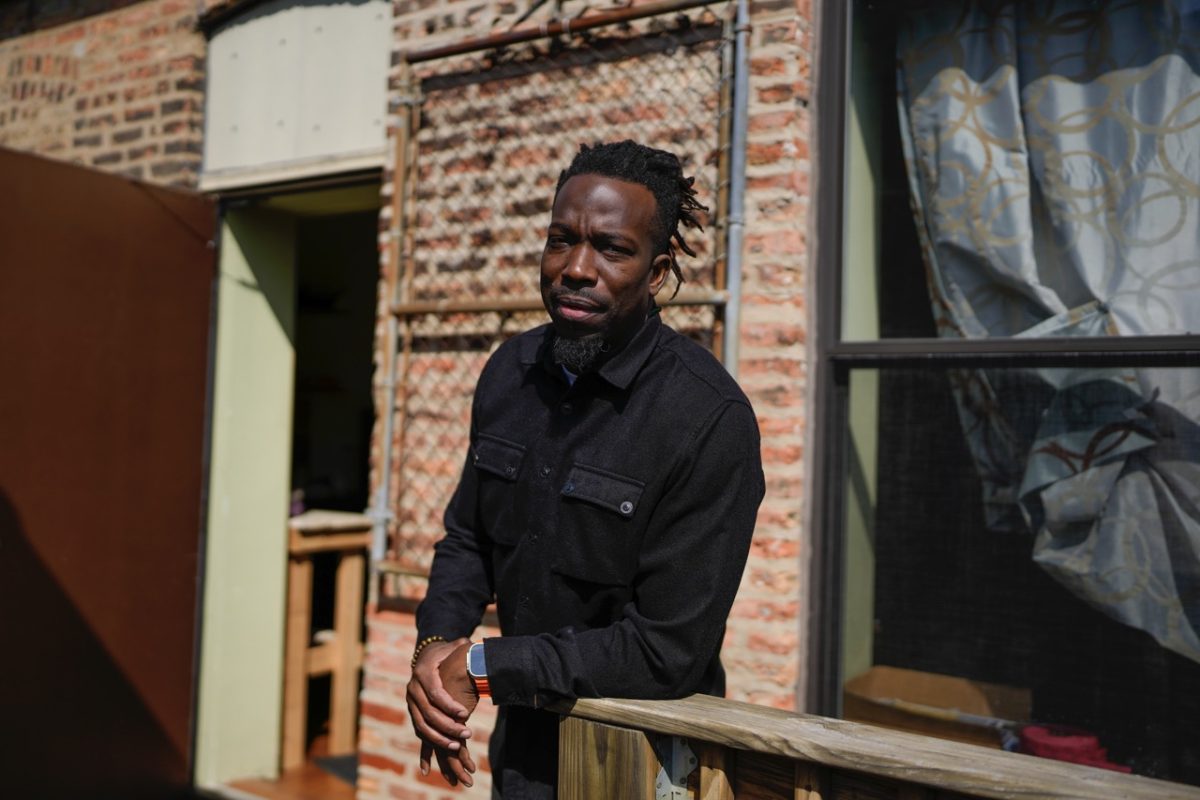A season-ending basketball injury two weeks before essential scouting tournaments ruined Cadet Madeline Crowell’s plans for a full-ride basketball scholarship in college.
“It was the worst feeling in the world,” Crowell remembered.
The Bel Air, Md. native considered attending The United States Military Academy at West Point but after researching programs and considering her options, she decided on DePaul and its U.S. Army Reserve Officers’ Training Corps (ROTC) Program.
“I’m happy [that I didn’t do West Point,]” said Crowell, a bubbly freshman health sciences/ pre med major. “ROTC fell into place and so did the basketball. I’m happy.”
This year, DePaul’s Army ROTC program has seen a 50 percent increase in members, currently boasting 30 members over the previous year’s 20.
Capt. Adam Malaty-Uhr completed his Army ROTC at Illinois State University and later graduated from The United States Army Ranger School. After testing careers that included everything from teaching high school to the training of Afghani police, Malaty-Uhr has managed DePaul’s ROTC for over a year and said that the increase is due to the segmentation of the University of Illinois at Chicago, which allows for more of an emphasis on individual schools and streamlines the application process.
DePaul’s U.S. Army Reserve Officers’ Training Corps (ROTC) Program, founded in 1952, is a part of the Rambler Battalion, which is headquartered in Loyola and includes Northeastern, Northwestern, North Park and Resurrection Universities.
Army ROTC serves to develop leadership skills and instill basic military training and knowledge in interested and qualified students. Malaty-Uhr works closely with Sgt. First Class Marc Westenbarger, who has been deployed to Iraq five times, to ensure the development of all who knock on their door.
“We’re looking for quality and quality usually seeks us out,” Malaty-Uhr said. “Really our job is to develop leaders. I hope that they walk out a little bit better leaders and have a better idea of what the military is about.”
For some, the development does not always include completing the program. Students are encouraged to try the basic courses and discern if the program is the right fit for them.
The scholarships that are offered through the Army ROTC program have different requirements, but all have a significant impact on students who receive it. For most, it was the deciding factor in attending DePaul, especially since the university provides a housing stipend of $7,500 to cadets, one of only two universities in Chicago to do so. Cadets also receive a monthly stipend, based on academic year, to cover any extra costs. The program and its scholarships are even available to graduate students, as long as they have two years of school remaining.
The program, which is available to all interested and qualified applicants, consists of the first track of basic training, involving one elective class and lab each semester along with the physical and field training exercises. These courses are typically fulfilled freshman and sophomore year and do not require a military commitment. The advanced courses that encompass junior and senior year, however, require a military commitment. In these courses, students learn advanced military tactics and experience team organization, planning and decision-making, according to the course website. The program is rigorous and for a vital reason.
“We have a requirement to produce quality officers because when you leave you will be in charge of 30-40 American soldiers,” Malaty-Uhr said.
Cadet Valerie Gonzalo is a junior intended business administration major and has been in ROTC for three years. Her decision to join was rooted in her family’s military history, her love of her country and a desire to challenge herself.
“My mom was very proud,” Gonzalo said. “She told me ‘this is probably one of the best things that you’ve done.”
“It’s just about the mindset,” Gonzalo said. “If you come in with an open mindset and ready to learn and are motivated …that’s basically what it takes to succeed.”
Gonzalo, whose conversation with her superiors is constantly peppered with smiles and respectful “sergeants,” “captains” and “sirs,” credits her development of leadership skills, time management and discipline that has been fostered in her since her freshman year in the program.
“It’s been a good experience, especially throughout the day,” Gonzalo said. “I feel like I’ve done more. Since we have classes, it helps with my time management, and I have more time to do things. I sleep better. I go to bed, I wake up and I know what I’m doing for the day.”
She added that the scholarship availability was a big factor in her deciding to attend DePaul, and that while her friends have to worry about looming debt after graduation, “all I have to worry about is working hard and doing well in ROTC.”
Upon graduation, Gonzalo would like to be active duty and work in either military intelligence or transportation. However, not all participants expect a prolonged stay in the fields.
Crowell wants to go along the Army’s medical track, eventually becoming a pediatrician. Cadet Brittany Beim is a junior elementary education major and plans to spend four years as active duty and then get her master’s degree, which would allow her to teach.
“I never thought about college without ROTC,” said Beim, whose father is a colonel and has been stationed in different bases and countries over the years.
When Beim describes the small town-like life on base in Stuttgart, Germany, Crowell, whose own father is in the Army, laughed, “There’s no way you could have gone to college and not done ROTC.”
Raised in a military family, Beim knows the misconceptions that linger in the air about the Army, ROTC and what the programs actually entail.
“Come talk to us!” Beim exclaimed. “I think people have this weird fear about joining it. Think of what you’re getting out of it. I’ve met some of the greatest people, my education is paid for and I’m going to have a job out of college. The advantages so outweigh the disadvantages.”
Gonzalo said that people who’ve spoken to her commonly think that ROTC is about shooting guns all day. One person even asked if training was like Call of Duty.
“Come and sit with us and see what we do,” Crowell invited.
An example of a cadet’s schedule would be a military science class (MSC) once a week where they attend class in government issued uniform and learn about the structure of the U.S. Army and receive training on the skills needed to be an officer. Physical training is a workout program designed to enhance overall fitness levels and happens every Monday, Tuesday, Wednesday and Friday morning. Leadership lab is once a week and is where cadets complete practical exercises based off what was covered in MSC.
The advanced cadets spent half of Thursday morning in lecture learning how to write operations orders for an ambush to be carried out by the basic level cadets who spent the first hour practicing military first aid and how to properly search a prisoner.
Malaty-Uhr has been impressed with the level of enthusiasm and dedication with which the cadets tackle the program.
“The kids here have so much pride in their school, and they want to be so successful that they work so hard and it shows in their leadership skills,” Malaty-Uhr said. “They have just bloomed into incredible, passionate, motivational leaders, and it’s just awesome.”
One of the biggest rewards that cadets feel they receive is the bond in their unit.
“The people I’ve met.” Beim said. “Gonzalo, she’s my battle buddy for life. I know she will always have my back. That’s the type of bond you can only get from ROTC.”
“It’s like a family,” Gonzalo said. “I think of them like my brothers and sisters.”
Crowell’s journey, which started with a broken dream in Bel Air, has culminated in a freshman experience made uniquely memorable by the dynamic 30-person unit at DePaul.
“I didn’t really know the true meaning of camaraderie until I got in this program and met these cadets.”







